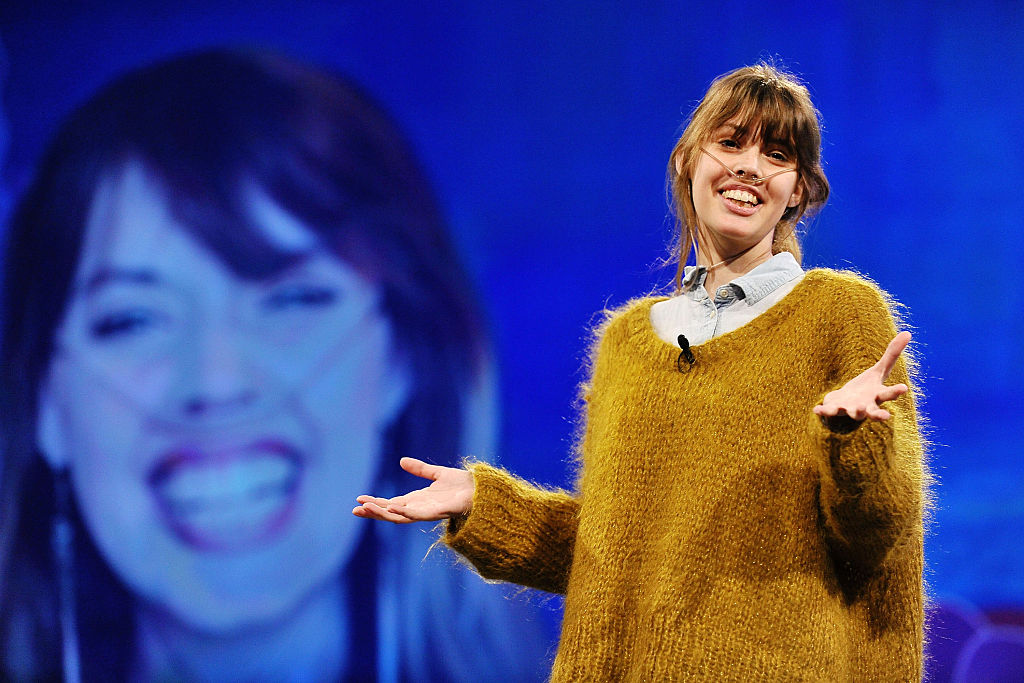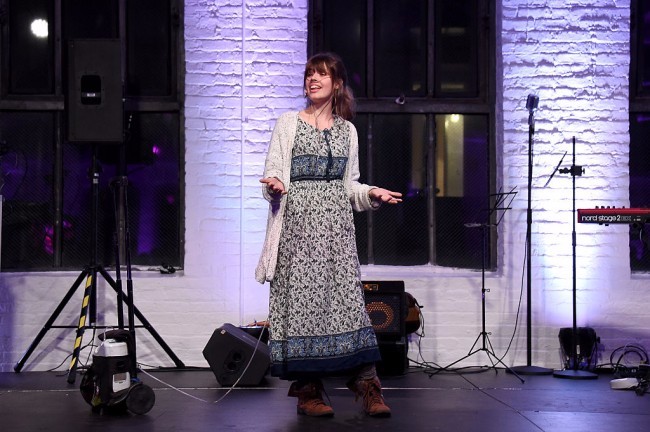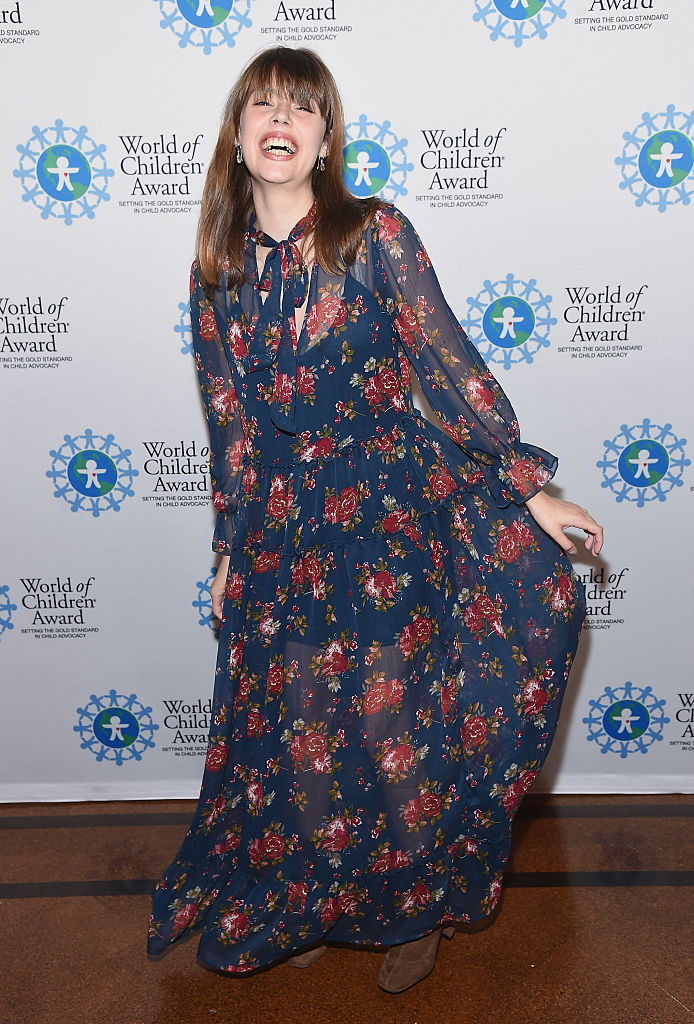
When Claire Wineland was 13 years old, she went into a coma. She had a one percent chance of surviving, and she’d already lived three years beyond doctor expectations.
Claire has cystic fibrosis, a disease which causes a thick buildup of mucus in the lungs and other internal organs. It comes with a devastating prognosis: There is no cure and it’s progressive — meaning that eventually, it’s terminal. Growing up, Claire was always sick. Her childhood was filled with hospital stays, treatments, and surgeries. Death was not just some abstract idea, like it is for most kids, it was a tangible thing that she faced every day.
This would be more than many adults could bear, but Claire adjusted. Eventually, it was simply a part of her reality. And she was happy growing up. Even as doctors warned that she only had a few years to live, again and again.
Now 19, Claire continues to not only defy the odds by surviving but by launching a successful foundation to help families of children with CF. Because Claire is filled with a drive and passion to serve others.
I had the pleasure to interview Claire recently, and one thing you’re struck with when you talk to her is how present and passionate she is. Rarely is someone so young such an articulate, vibrant, and excellent speaker. Claire’s energy and compassion permeated every aspect of our conversation. And in the face of a tough disease and even tougher prognosis, Claire lives her life with humor and grace.
We talked about her work at the foundation, finding your passion, and living life to its fullest.
So I was wondering if you could tell me a little bit about the work you do at Claire’s Place Foundation, how it came to be, and what it means to the families that you help.
So when I was 13 years old, I went in for just a regular operation and ended up getting a blood infection. It attacked my lungs, and I went into (what was) a two-and-a-half-week coma.
And that was really a huge ordeal. Not just for me but for my family, right? Because they had to be there and support me but they also had lives going on outside the hospital, and bills to pay. But we were incredibly lucky because we had so many people in our lives that came out of the woodwork to support me and my family. To bring food and snacks, and help them pay their bills, and help them raise money. So I came out of that whole experience realizing how lucky we were to have that support. Because very few families with CF do have that kind of support.
That’s how the whole foundation came to be. We just realized that there was this big gap missing in the CF world. Most of the money that gets raised goes directly towards finding a cure, and there’s not a lot out there to help families living right now. There’s not a lot to help families with the day to day life of CF. Which is bills and paying the rent while your kid is in the hospital, while (you’re also) taking care of your other kids. You know, a bunch of stuff like that.
That’s how the foundation came about and we’re so incredibly lucky that we’ve been able to do it.
I think the thing that is so important to me when I think about the foundation and what we get to do, is that it’s really just about covering the basics for people. (Because) the last thing you want to be thinking of is how you’re going to pay your bills when your kid is really sick, when your kid is dying. So for me it’s taking that huge burden off their shoulders so that they can be there with their kids. And it’s coming from such a personal experience. I truly feel like foundations are able to work and make a huge impact if they’re coming from personal experience, coming from actually having been there. And so yeah, I’m incredibly lucky and I love what we get to do.
I saw a video of your talk at Zappos, and it was so great. But you talk about such a personal experience. What is it like sharing your personal life so openly with people?
That’s funny! I don’t think about it very much. I’ve always been a huge over-sharer. When I was really little, I was always the kid who we don’t tell secrets to because she’ll go blabbing them to everyone. My favorite story that my mom tells is that I was maybe five or something. Maybe six, and me and my cousins rode in the back of a truck. Which you know is illegal, technically, and my mom was telling me, “Don’t tell anyone about this, Claire! This is illegal, now you’re not going to tell anyone…” And then we go up to the camp site and lo and behold, there’s two sheriffs at the campsite. You know, patrolling. And the first thing that little Claire does is just run up to one of the sheriffs and go “Guess what! I rode on the back of a truck!!”
I was the little big mouth in the family.
So I never really had any boundaries regarding what I talk about and what I share with my personal experience. And I feel…there’s so much to share in all of our lives. I don’t think my life is much more special because I have CF. I think we all have a lot going on and a lot to share. I think it’s just hard sometimes to share what makes our life hard and what we’ve been through, what makes our life complicated, and what makes it challenging. It’s easy to think that the challenges we’ve been through — that’s our dark side — is what we don’t show people. But I think, in reality, a lot of times, that stuff ends up being what makes you not only who you are, but what gives you something important to share with the world.
I think we all have the opportunity to do that. We just tend to be ashamed and then hide it.

What would you say helps you get through your hard times? What do you like to do by yourself and with your family that helps you get through the hospital and the harder experiences?
I guess the big thing is humor, we’re all very goofy. When I was growing up a lot of times humor saved us when we were going through periods of stress and CF got to be too much.
But in general, I’m a reader so I love reading. When life gets too hard I like to escape into far-off worlds and crazy fantasy. But I think the big thing that “gets me through” is that I love learning about how many other people there are out there in the world. And thinking about what they’re doing with their lives. You know what I mean? I’ve always been fascinated by what people are doing in the world. And I’m studying anthropology right now in school, and for me, when I feel like things get too hard and you get kind of stuck in your own head (we all can get stuck in our own brains). I like to think about all the things that are going on in the world and how really, in the grand scheme of things, I’m a tiny little spec, and the choices I make (good or bad), don’t really matter that much at the end of the day. I’m one person and that’s kind of comforting in a way.
You started this foundation to help families of kids with CF. What about your own family? Is it hard to watch them go through your hard times, and how do they support you in daily and in long-term ways?
Good question. You know it’s funny. When I was born, my parents, they had no idea what CF was. Like none whatsoever.
Yeah, it is. It was a huge shock to them. And completely changed their lives. And it’s interesting because looking at it now, almost 20 years later, they have grown so much as people, you know? I mean ’cause they were young and they were crazy in a lot of ways. And so, it’s interesting looking at it now how much their lives have changed.
My mom has gotten so much out of being able to run the foundation. And it’s become her baby. And that’s so incredible for her. Because before that, our entire lives, she went from job to job, and (then) she ended up finding her place in the CF community and working in this world.
And my dad, my dad has grown so much from it too. Before, he had a lot of fear around death and dying, and he always had a weird relationship with death So to have a daughter who was so close to it…I think they both kind of worked through things that they had going on for them, you know what I mean?
Yeah.
It’s weird to say that it kind of helped them in a way? But I think it did. I think it made all of us grow. And it’s also held us together. Because my parents haven’t been actually together since I was around 3 years old. They split when I was very little but we’re all so close and we kind of had to be. Because you can’t just go off into your own world when your kid has CF. You have to be present, you have to be there for them. So it forced them to stay close and they’re a huge help to me in my life.
I have so many great memories of being with my dad in the hospital and watching stupid movies. And every time I had a surgery my dad would come right after the surgery, and my mom would be there for the before time. And then they’d meet up in the waiting room while I was in surgery and switch. There are so many strange memories in my life. That shouldn’t seem comforting, that shouldn’t seem sweet, but are. Like before surgeries, being with my parents, and all just being really close. We couldn’t really afford not to be close.
And I think a lot of teenagers can cut themselves off from their parents and go off on their own. And figure it out for themselves and then, maybe five years down the line, come back to their parents and be like, “Oh! I missed you so much!” But I can’t really afford to do that because I need their support in my life, both physically and mentally with everything I go through. So, I never really could cut off from my parents and that’s forced me to work through it.
You’ve described CF as climbing a mountain with heavy stones being added. And I thought that was such interesting imagery, I was wondering, how are you feeling these days and where you are with your treatments?
Yeah…treatments. It’s interesting for me because treatments…it is progressive that I’m at the point in my life where I’m trying to figure out how to live life with a lot of passion.
Yeah, of course.
Because the last thing you want to do is spend five hours a day doing treatments and taking pills. You want to go out and you want to live your life. But it takes a certain level of care, that I’m really starting to learn to take more seriously, I guess. I’ve always been kind of crazy and had my head up in the clouds. And I’m starting to think about it more. And it’s getting harder as well, you know? Because as I get older it gets harder so there are more medications than I’ve ever been on in my entire life right now, and, it’s a weird thing to say because I’ve been on so many meds my entire life. But this is the most it’s ever been and then a month from now it’ll be the most it’s ever been. And so on and so forth, so it’s crazy a lot.
And it’s a lot too to do this every day. Knowing that it’s not going to fix you.
So much of what people do to be healthy…like I live five minutes from Erewhon, the grocery store, which is like an even more expensive Whole Foods, And everyone there is spending 200 dollars on crazy, weird stuff so they can try and not ever get sick. And be as healthy as they possibly can so they can avoid dying as long as they possibly can. And for most people, when they put energy into their health, they know they’re going to get an outcome. They know they’re going to get better, and they’re going to get over whatever cold they have. When you have a flu, you don’t think, ‘Oh I’m gonna have this flu for the rest of my life’, you think, ‘I’m gonna work hard, I’m gonna drink lots of fluids and it’s going to be over soon’. With CF, you know it’s not going to be over soon. You know it’s just going to keep getting worse. And you just have to do what you have to do. And there’s this interesting “mind over matter” to get yourself to do it anyway. It’s like okay! You know you’re not going to get better, but let’s still do it! It goes against a lot of your natural human instincts._
You’ve talked before about living in the moment. Do you have advice for people to try to live in the moment, and how they can get to a place where they’re living in the moment more?
Yeah, I think my advice for people is that, it sounds really simple, but you have to find what makes you feel really alive and you gotta just go with it!
It’s a big misconception in life that it’s these huge moments, getting a certain job, meeting a certain person, but those don’t change your life. Those are things that happen to you, They’re just part of growing up. Everyone’s going to find where they belong and what they’re going to be doing and all of that. But it’s the little things, it’s finding people to be around that you love. It’s doing things in your day to make you happy. It’s noticing how beautiful everything is, and really appreciating where you are as a person.
_







